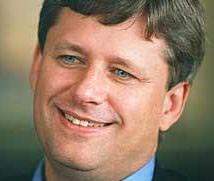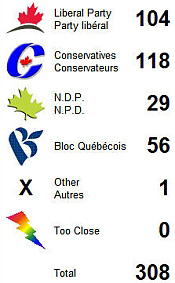 |
Everyone from the gamblers at UBC’s Election Stock Market, to the team predicting the election outcome for CTV, and the generally reliable folks at SES Research are suggesting the Conservative Party of Canada will achieve minority government status in Ottawa with a win at the polls on Monday.
The time has come then, one supposes, for VanRamblings to weigh in on the current federal election, to offer our two cents worth and reflect on what a Conservative Party win will mean for most of us hapless Canadians.
 Click on the picture |
Much of what we wrote during the 2004 federal election still applies. Stephen Harper is just as scary as he was last time around. The issues are still the same. This time around, though, the Conservative Party has found a way to keep their social conservative contingent quiet, effectively silencing the wingnut portion (73%) of their party. All in service of gaining power.
In the coming months, will soon-to-be-deposed Prime Minister Martin be proven correct when he states that a Conservative government would imperil a woman’s right to choose, or stack the Supreme Court with right-wingers?
 Election Prediction Project |
Should Canadians, in fact, beware a far-right Tory government that would, as Mr. Martin states, “roll back the Liberals’ proposed national day-care plan, Canada’s commitment to the Kyoto protocol as well as a recent federal-provincial aboriginal deal?” Yes, VanRamblings believes Canadians should be damned scared of losing the Canada we — and our fathers, mothers, sisters and brothers — have built over the course of the past 139 years.
Oh sure, it all sounds like so much rhetoric now, to target the Tories as right-wing ideologues. But aren’t they? Isn’t the Conservative Party of Canada just like the Lie-berals in B.C. (hardly a Liberal party), or the Republican Party under George Bush, or England under Maggie Thatcher?
You’re damn right they are.
Even small-c conservative commentators like the Vancouver Sun’s Barbara Yaffe warns Canadians about what a Stephen Harper-led Tory government would mean for Canadians …
Harper is an adherent of a set of beliefs that even has a name associated with it — the Calgary School. His advisers, nearly all white and male, adhere to the brand of hard-line, U.S.-style conservatism associated with this school.
And, let’s not forget, as recently as 2002 Harper was leading the National Citizens’ Coalition, a right-leaning, libertarian-inclined group.
He still accommodates within his caucus old-style Reformers, like Myron Thompson, Cheryl Gallant (RealPlayer required) and Stockwell Day. (To be fair, Liberals have their own eccentrics.)
In this election, Conservatives have run the lowest percentage of female candidates of any mainstream party.
It would also be hard to believe that Harper’s own personality — a reserved loner, reluctant to take counsel from others — has suddenly morphed. Indeed, his own dominant personality has stripped the party entirely of the populism that characterized its precursors, Reform and the Alliance.
Voters should not fool themselves into imagining that Conservatives, once in power, would … downsize government, stubbornly persist in trying to limit the definition of marriage to the cookie-cutter man/woman model … (not) be bound by the Kyoto protocol … (and) appoint judges with ‘a judicial temperament’ …
After a relatively brief fling with one of Canada’s least ideological prime ministers, voters are about to embrace an ideologue.
The Conservative Party slogan in this election campaign calls on Canadians to ‘Stand Up for Canada’. VanRamblings would ask that you do exactly that.
Stand up for a Canada where a woman’s right to choose is enshrined in law. Stand up for a Canada where tolerance, cultural and ethnic diversity, our role as a peacekeeper on the world scene, and protection of the interests of our most vulnerable citizens define who we are as a people.
You know what the issues are. You know what’s on the line. And you know that you do not, we do not want Stephen Harper’s Canada.